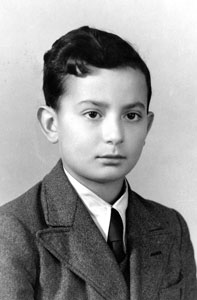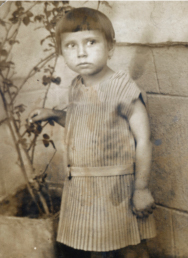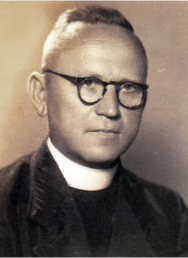
Kurt Kotouc
Czech RepublicInterviewed in Prague in 2006 by Pavla Neuner
Historical Note: Czechoslovakia was one of the successor states carved out of the Austro-Hungarian Empire in the wake of the First World War. It was the only stable democracy in the region and had the strongest economy. In the fall of 1938, Adolf Hitler demanded from the British and French that Czechoslovakia be forced to cede to Nazi Germany the outer rim of the country—where some 2 million ethnic Germans lived. The allies agreed and Neville Chamberlain, the British Prime Minister, described the situation as “a quarrel in a faraway land of which we know nothing.” Hitler had promised that with this territorial conquest, he would have no further demands. Six months later he invaded Czechoslovakia and dismembered it. Kurt Kotouc tells us about being a schoolboy at that time.
Read the biography
View the family pictures here.
“That is when I realized that my own father couldn’t help me, that the man I respected the most was powerless in the face of hate.”
From 1939, Brno’s powerful German minority began to buzz with traditional German hats and Henlein organizations [Konrad Henlein was the leader of the ethnic German movement of Czechoslovakia]. Suddenly the way to school along the Spielberg hill became dangerous. Teens from the Hitlerjugend [Hitler Youth] waited for us there and our only defense was humiliating: all we could do was run away.
It wouldn’t be more than an adventure, if we, Jewish children, could share these experiences with our non-Jewish friends – as a shared fate. But we had to give up our friendships and start new ones with other Jewish boys out of self-protection; we had to exchange friendships that came naturally for friendships that arose from being among the condemned.
I remember going to visit a friend. His mother opened the door a crack and said, ‘He isn’t home!’ The same thing happened the next day. Later, some feeling inside told me that my friend was not home for me because I was a Jew. I came home and, because I felt shame, I didn’t even tell anyone about it.
Later, in the streets, I met my favorite teacher, who used to praise my brother Hanus and me for our good school performance. On his collar he wore the symbol of the Narodni sourucenstvi [Czech fascist organization, from 1939 – 1945 the only legal political party in the Protectorate of Bohemia and Moravia], and he said, ‘I knew that it couldn’t end differently with the Jews.’
Another time a group of guys jumped me and they twisted my arm behind my back and one of them asked, ‘Do you know where you belong Jew?’ By coincidence someone was passing by so I was let go. At home, my father warned me not to go there. That is when I realized that my own father couldn’t help me, that the man I respected the most was powerless in the face of hate.
Kurt Kotouc would go on to be deported to the Terezin (Theresienstadt) ghetto, where he remained for two years. In September 1944 he was deported to Auschwitz. During his incarceration in Terezin, Kurt Kotouc lived in barracks number one with Petr Ginz, the boy most responsible for the secret magazine, Vedem (In the Lead).
BULLYING STORIES

“It’s something that never leaves you. It’s something you never forget, no matter how long you live.”
STANDING UP STORIES

“The priest gave me a Christian name for my false papers. I’ve kept it ever since because he didn’t just give me a name, he gave me a life.”